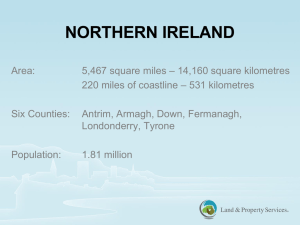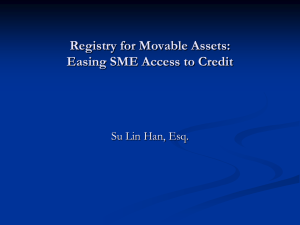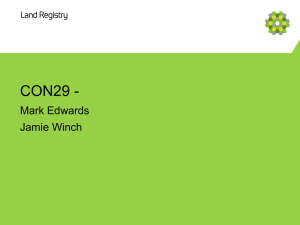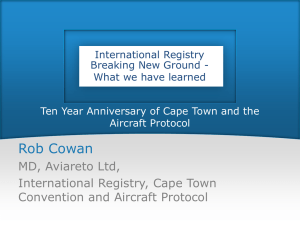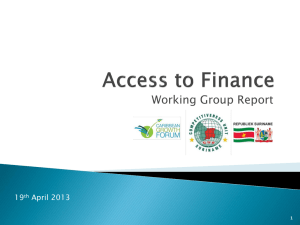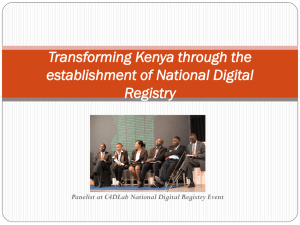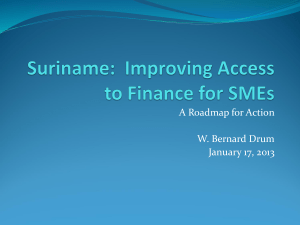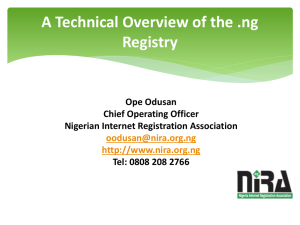Promoting SME Finance: A case for Developing Secured
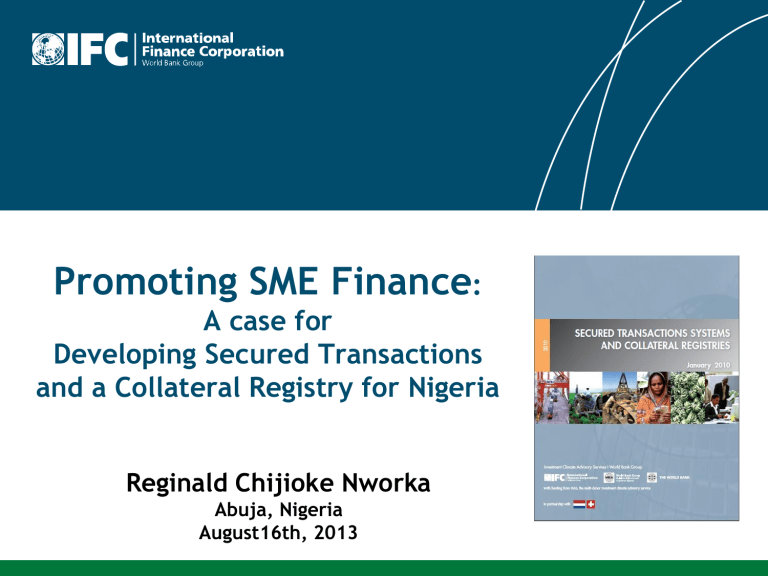
Promoting SME Finance
:
A case for
Developing Secured Transactions and a Collateral Registry for Nigeria
Reginald Chijioke Nworka
Abuja, Nigeria
August16th, 2013
OUTLINE
1. What is a Secured Transactions System?
2. Why is it Important for Nigeria?
3. Current State of Secured Transactions in Nigeria and
Relevant Stakeholders
4. Potential Impact Based on Results in Other
Jurisdictions
4. Proposed Next Steps for Nigeria
2
What is a Secured Transactions System?
Legal and institutional framework to facilitate the use of movable property as collateral for both business and consumers credit
Bank Accounts
Accounts receivable and secured sales contracts
Inventory and raw goods Intellectual Property rights
Industrial and agricultural equipment
Durable consumer goods
Agricultural products (crops, livestock, fish farm)
3
Vehicles
Why is secured transactions important for Africa and Nigeria?
4
SME Finance Gap
SME FINANCE GAP IN SUB-SAHARAN AFRICA Between US$ 140-170 Billion
Source: McKinsey & Co. Global Financial Inclusion Practice
5
SME Finance Gap
CGAP/World Bank– Only 5% of SMEs Have Access to a Loan
70% of SMEs were denied financing when applying to a loan
80% of SMEs did not apply for financing but would like to have a loan/line of credit
•% of Firms Using Banks to Finance Working capital
•SME FINANCE GAP AND COLLATERAL GAP
•SME Finance Gap
• IN NIGERIA, AROUND US$ 62 BILLION
•Source: IFC-McKinsey
•MISMATCH BETWEEN ASSETS OWNED BY COMPANIES
AND COLLATERAL REQUIRED
22%
27%
44%
34%
Vehicles/machinery/equipment
Accounts Receivable
Land / Real Estate
•Source: World Bank Enterprise Surveys
73%
Land / Real Estate Movable property
Collateral Gap
Lack of adequate collateral Mismatch between assets owned by companies and collateral required
Credit Application Rejected -
Insufficient Collateral
80%
70%
60%
50%
40%
30%
20%
10%
0%
Capital Stock of Firms
22%
44%
Collateral Taken by FIs
27%
73%
Land / Real Estate
Did not apply: Collateral
35%
30%
25%
20%
15%
10%
5%
0%
Did Not Apply: Collate ral
Application Would be Rejected
Af rica East Asia ECA Latin
America
South
Asia
34%
Vehicles/machinery/ equipment
Source: World Bank Enterprise Surveys
8
•BENEFITS OF A MODERN SECURED TRANSACTIONS SYSTEM
• INCREASES ACCESS
TO CREDIT
REDUCING THE
RISK OF CREDIT
- Underserved
SMEs and women entrepreneurs
- Promotes risk management, prudent lending
Better interest rates
- Move from informal to formal financing
- Cost savings for businesses
• REDUCES THE
COST OF CREDIT
• INCREASES
MARKET
COMPETITION
- Development of industries
(factoring and leasing)
- NBFIs
- Credit risk diversification: immovable and movable
- Sector diversification in the portfolio
• PROMOTES CREDIT
DIVERSIFICATION
9
Why are financial institutions not lending, taking movable property as collateral?
Lack of Adequate Legal
Framework
Lack of Registry of
Security Interests in
Movables
Lack of Know How on
Movable Asset Lending
Not Interested
Restrictions on types of assets
Lack of clear creditor priority
Enforcement issues
Dysfunctional Registry
No Registry
Lack of publicity
No transparency
Have never done that type of financing
Do not have the staff with skills
Not their type of business
No competition in the lending markets
Revenue from other sources (TB)
10
How does IFC implement this work?
11
Business and delivery model
1
• LEGAL AND
REGULATORY
FRAMEWORK
1. Create Committee
2. Draft new Secured
Transactions Law
3. Awareness
4. Submit Law to
Parliament
5. Draft registry regulations
1. Determine
Government Agency to Host Registry
2. Develop Technical
Specifications
3. Hardware and
Software
Procurement
4. Training/awareness
5. Launching of registry
• CREATION OF
ELECTRONIC
REGISTRY
2
4
• MONITORING
IMPACT
1. Develop monitoring and evaluation plan including baseline information
2. Conduct periodic monitoring of impact through registry indicators and surveys
1. Training and awareness to main stakeholders (both public and private sector) on the new system, including law and registry
2. Training on movable asset financing for Financial
Institutions
• BUILDING THE
CAPACITY OF
STAKEHOLDERS
3
12
Current project Portfolio
AFRICA
Ghana
Rwanda
OHADA
South Sudan
Sierra
Leone
Liberia
MENA
Afghanistan
Jordan
Lebanon
Palestine
Morocco
Egypt
Yemen
UAE
AMF
PIPELINE
EAST ASIA
& PACIFIC
China
Lao PDR
Mongolia
Philippines
Vietnam
SOUTH
ASIA
Sri Lanka
Nepal
India
ECA
Azerbaijan
Belarus
Moldova
Tajikistan
Uzbekistan
LAC
Colombia
Haiti
Costa Rica
AFRICA (Nigeria, Guinea, Coted’Ivoire, Togo, Zambia)
13
Africa portfolio and early results
14
GHANA -Secured Transactions Reform
Project components:
1) Legal Framework:
• Borrowers and Lenders Act, 2008
• Registry regulations, 2012
2) Collateral Registry:
• New on-line registry, 2012
Next Steps:
• Enactment of revised B&L Act, 2013
• Ongoing awareness and capacity building
Key results (as of Dec. 2012):
More than 45,000 loans registered
More than US$6 billion in financing using movable assets as collateral to
- SMEs (21%)
- Micro enterprises (65%)
- Women entrepreneurs (70% of micro loans)
Movable Collateral:
- Inventory & receivables (24%)
- Motor vehicles (17%)
- Household goods (17%)
15
GHANA - Impact on SMEs: A practical case
CAL BANK: Purchase Financing Scheme for Gold Mining
Developed a local supply chain for big mining corporations, through local SME service providers
More than 100 local SMEs have received more than US$ 10 million.
Created hundreds of new jobs.
SMEs use movable assets (contracts, receivables, equipment) as collateral
No defaults in the 30 months that program has been operating
16
LIBERIA -Secured Transactions and Collateral Registry Project
Context:
Average NPL rates at 23.6%
Lack of access to finance for enterprise development (35% of firms identify it as a major constraint)
Only 14% of firms have a loan/credit line
Strong Institutional Support:
Central Bank of Liberia
Legal Framework:
New Secured Transactions Law, enacted in 2010 (Commercial Code)
Registry regulations approved
Next Steps:
Registry design and development
Communications & Public Awareness
Training and capacity building
17
Impact of reforms in other regions
18
Impact of Secured Transaction Reform in Asia and Latin America
MEXICO
Law reform and new centralized online registry (October 2011)
Over 125,000 loans have been registered – 45% to the agricultural sector and 90% to SMEs
Businesses have saved US$3.8 billion in fees because the registrations and searches are free
HONDURAS
Law reform enacted (based on OAS Model Law) and new centralized online registry (March 2011)
Introduced extrajudicial enforcement as result of the reform
More than 12,000 loans registered, mostly for SMEs
CHINA
Law reform (2007) and new centralized online registry for accounts receivables and leasing (2008)
Project has led to more than US$ 3.5 trillion in financing secured with receivables, mostly to SMEs (60%)
Development of the factoring and leasing industries
19
The Way Forward For Nigeria
20
Business and delivery model
1
• LEGAL AND
REGULATORY
FRAMEWORK
1. Create Committee
2. Draft new Secured
Transactions Law
3. Awareness
4. Submit Law to
Parliament
5. Draft registry regulations
1. Determine
Government Agency to Host Registry
2. Develop Technical
Specifications
3. Hardware and
Software
Procurement
4. Training/awareness
5. Launching of registry
• CREATION OF
ELECTRONIC
REGISTRY
2
4
• MONITORING
IMPACT
1. Develop monitoring and evaluation plan including baseline information
2. Conduct periodic monitoring of impact through registry indicators and surveys
1. Training and awareness to main stakeholders (both public and private sector) on the new system, including law and registry
2. Training on movable asset financing for Financial
Institutions
• BUILDING THE
CAPACITY OF
STAKEHOLDERS
3
21
DONOR
COMMUNITY
(DFID,
IFC/WBG)
STAKEHOLDER FRAMEWORK
CENTRAL
BANK OF
NIGERIA
- CORPORATE
AFFARIS
COMMISSION
- FEDERAL
MINISTRY OF
FINANCE
- FEDERAL
MINISTRY OF
JUSTICE
FINANCIAL INSTITUTIONS, MFIs, NBFIs
BUSINESSES (CORPORATES, MSMEs, INDIVIDUAL
ENTREPRENEURS), BUSINESS ASSOCIATIONS, CHAMBERS OF
COMMERCE, INDUSTRY ASSOCIATIONS, CONSUMERS
THANK YOU!
Reginald Chijioke Nworka
IFC Global Secured Transactions & Collateral
Registries Program
Rnworka@ifc.org
23
